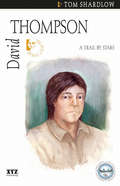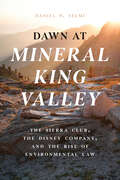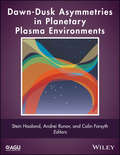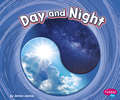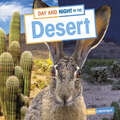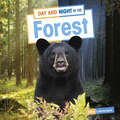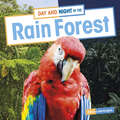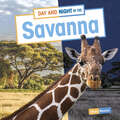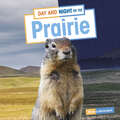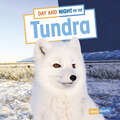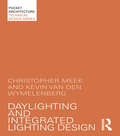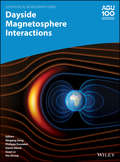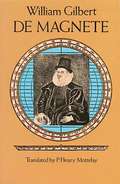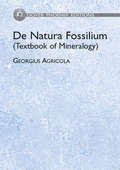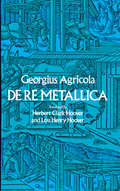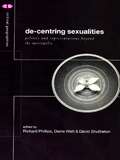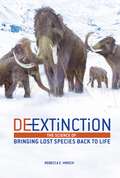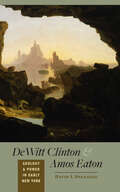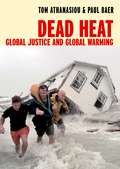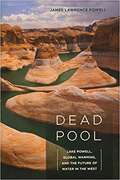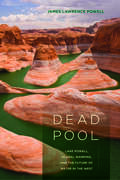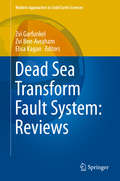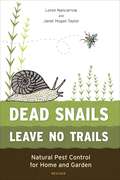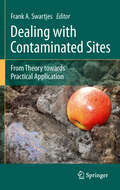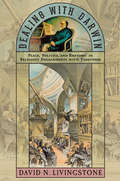- Table View
- List View
David Thompson
by Tom ShardlowAcross North America in 2007-2009, communities will celebrate the David Thompson Bicentennials. For 34 years the great explorer, surveyor, and fur trader travelled across the continent, finding and mapping the routes between the St. Lawrence and the Pacific. Trusting the stars and his sextant, he surveyed a continental area so vast it remains a mapping achievement unequalled in human history. This is the story of David Thompsons epic journey his trail by stars.
Dawn at Mineral King Valley: The Sierra Club, the Disney Company, and the Rise of Environmental Law
by Daniel P. SelmiThe story behind the historic Mineral King Valley case, which reveals how the Sierra Club battled Disney’s ski resort development and launched a new environmental era in America. In our current age of climate change–induced panic, it’s hard to imagine a time when private groups were not actively enforcing environmental protection laws in the courts. It wasn’t until 1972, however, that a David and Goliath–esque Supreme Court showdown involving the Sierra Club and Disney set a revolutionary legal precedent for the era of environmental activism we live in today. Set against the backdrop of the environmental movement that swept the country in the late 1960s and early 1970s, Dawn at Mineral King Valley tells the surprising story of how the US Forest Service, the Disney company, and the Sierra Club each struggled to adapt to the new, rapidly changing political landscape of environmental consciousness in postwar America. Proposed in 1965 and approved by the federal government in 1969, Disney’s vast development plan would have irreversibly altered the practically untouched Mineral King Valley, a magnificently beautiful alpine area in the Sierra Nevada mountains. At first, the plan met with unanimous approval from elected officials, government administrators, and the press—it seemed inevitable that this expanse of wild natural land would be radically changed and turned over to a private corporation. Then the scrappy Sierra Club forcefully pushed back with a lawsuit that ultimately propelled the modern environmental era by allowing interest groups to bring litigation against environmentally destructive projects. An expert on environmental law and appellate advocacy, Daniel P. Selmi uses his authoritative narrative voice to recount the complete history of this revolutionary legal battle and the ramifications that continue today, almost 50 years later.
Dawn-Dusk Asymmetries in Planetary Plasma Environments
by Stein Haaland Andrei Runov Colin ForsythDawnDusk Asymmetries in Planetary Plasma Environments Dawn-dusk asymmetries are ubiquitous features of the plasma environment of many of the planets in our solar system. They occur when a particular process or feature is more pronounced at one side of a planet than the other. For example, recent observations indicate that Earth's magnetopause is thicker at dawn than at dusk. Likewise, auroral breakups at Earth are more likely to occur in the pre-midnight than post-midnight sectors. Increasing availability of remotely sensed and in situ measurements of planetary ionospheres, magnetospheres and their interfaces to the solar wind have revealed significant and persistent dawn-dusk asymmetries. As yet there is no consensus regarding the source of many of these asymmetries, nor the physical mechanisms by which they are produced and maintained. Volume highlights include: A comprehensive and updated overview of current knowledge about dawn-dusk asymmetries in the plasma environments of planets in our solar system and the mechanisms behind them Valuable contributions from internationally recognized experts, covering both observations, simulations and theories discussing all important aspects of dawn-dusk asymmetries Space weather effects are caused by processes in space, mainly the magnetotail, and can be highly localized on ground. Knowing where the source, i.e., where dawn-dusk location is will allow for a better prediction of where the effects on ground will be most pronounced Covering both observational and theoretical aspects of dawn dusk asymmetries, Dawn-Dusk Asymmetries in Planetary Plasma Environments will be a valuable resource for academic researchers in space physics, planetary science, astrophysics, physics, geophysics and earth science.
Day and Night (Cycles of Nature)
by Jaclyn JaycoxThe sun shines bright during the day, but why can't you see it at night? Follow the patterns of the sun and Earth to learn what causes day and night.
Day and Night in the Desert (Habitat Days and Nights)
by Ellen LabrecqueSpend a day and night in the desert! Learn about this dry habitat through the unique animals that call it home. Stand with meerkats during a watchful hunt for insects. Spot a jackrabbit taking a shaded midday nap. Join a desert tortoise as it dines on colorful cactus fruit. After dark, follow a snake as it slithers in cool, moonlit sand. What will tomorrow bring in the desert?
Day and Night in the Forest (Habitat Days and Nights)
by Ellen LabrecqueSpend a day and night in the forest! Learn about this wooded habitat through the fascinating animals that call it home. Leap from tree to tree with a squirrel searching for breakfast. Pounce with a fox on the forest floor. Soar with a red-tailed hawk as the sun sets. After dark, build a dam with a beaver. What will tomorrow bring in the forest?
Day and Night in the Rain Forest (Habitat Days and Nights)
by Ellen LabrecqueSpend a day and night in the rain forest! Learn about this lush habitat through the diverse animals that call it home. Start the morning suspended high in the canopy with a colorful toucan. Curl around a branch and bask in afternoon sun with an emerald boa. At sunset, pace the forest floor for prey alongside a sleek jaguar. After dark, spy a nocturnal sloth slowly wake after a full day of slumber. What will tomorrow bring in the rain forest?
Day and Night in the Savanna (Habitat Days and Nights)
by Mary BooneSpend a day and night in the savanna! Learn about this grassy habitat through the interesting animals that call it home. Nibble a breakfast of sky-high leaves with a giraffe. Then construct towering mounds with termites. At sunset, shriek and prowl for prey with a pack of hyenas. After dark, go on a high-speed hunt with a cheetah. What will tomorrow bring in the savanna?
Day and Night on the Prairie (Habitat Days and Nights)
by Ellen LabrecqueSpend a day and night in the prairie! Learn about this grassy habitat through the exciting animals that call it home. Spot prairie dogs popping aboveground as morning sun floods a field. Join giant bison as they graze on grass. Stir up dust on a sunset sprint with antelope. After dark, stake out prey with a coyote in dense grass. What will tomorrow bring in the prairie?
Day and Night on the Tundra (Habitat Days and Nights)
by Mary BooneSpend a day and night in the tundra! Learn about this cold habitat through the intriguing animals that call it home. Catch breakfast mid-flight with a peregrine falcon. Spend the afternoon snoozing with an Arctic fox. Take an evening trek with a herd of caribou. After dark, sit still with an Arctic hare as it hides from hungry wolves. What will tomorrow bring in the tundra?
Daylighting and Integrated Lighting Design (PocketArchitecture)
by Christopher Meek Kevin Van WymelenbergDaylighting and Integrated Lighting Design provides architects, building designers, and students clear direction for the successful inclusion of daylight and integrated electric light in buildings. It presents design teams with the performance analysis resources, energy saving estimates and user satisfaction results they need in order to make informed decisions regarding daylighting and lighting design. Written by two well-known experts in the field, the book provides: critical geometric and material relationships along with proven design process activities, offered in a quick-reference format, with sufficient context to address the range of associated issues present in any building project both the "fundamentals" and "applications" which cover design concepts and practice activities applicable to all integrated lighting projects specific directives for how the concepts covered are applied in a range of common design scenarios, including architectural rules-of-thumb, instructions for ensuring visual comfort, and preferred approaches for electric lighting control integration. In demonstrating these necessary insights to designers, the authors employ an iterative analysis of common "daylighting patterns" and illustrate and annotate both successful and unsuccessful examples via built form and simulation. Part of the PocketArchitecture series, this is the ideal pocketbook for any designer serious about reducing the energy impact of their buildings.
Dayside Magnetosphere Interactions (Geophysical Monograph Series #249)
by Hui Zhang Philippe Escoubet David Sibeck Guan Le Qiugang ZongExploring the processes and phenomena of Earth’s dayside magnetosphere Energy and momentum transfer, initially taking place at the dayside magnetopause, is responsible for a variety of phenomenon that we can measure on the ground. Data obtained from observations of Earth’s dayside magnetosphere increases our knowledge of the processes by which solar wind mass, momentum, and energy enter the magnetosphere. Dayside Magnetosphere Interactions outlines the physics and processes of dayside magnetospheric phenomena, the role of solar wind in generating ultra-low frequency waves, and solar wind-magnetosphere-ionosphere coupling. Volume highlights include: Phenomena across different temporal and spatial scales Discussions on dayside aurora, plume dynamics, and related dayside reconnection Results from spacecraft observations, ground-based observations, and simulations Discoveries from the Magnetospheric Multiscale Mission and Van Allen Probes era Exploration of foreshock, bow shock, magnetosheath, magnetopause, and cusps Examination of similar processes occurring around other planets The American Geophysical Union promotes discovery in Earth and space science for the benefit of humanity. Its publications disseminate scientific knowledge and provide resources for researchers, students, and professionals.
De Magnete
by William GilbertMuch of modern science is based upon the theories and discoveries of William Gilbert, the brilliant English physician and physicist who was the first great experimental scientist. Gilbert was the first to use the word "electricity," to recognize mass as distinct from weight, to discover the effect of heat upon magnetic bodies, to differentiate clearly between static electricity and magnetism, and to explain phenomena of terrestrial magnetism in terms of the earth as a giant magnet.In 1600 he published De Magnete in Latin. As lively and entertaining as it was scientifically scrupulous, it summarized everything that had previously been known about electricity and magnetism, founded a new science and earned Gilbert the title of "the father of modern electricity." In it Gilbert explores magnetism and electricity, lodestones, phenomena of magnetism, direction of the earth's magnetic lines of force, variation in the compass, dip, the concept of the earth as a giant magnet, and much else.This Dover edition is a complete, unabridged reprinting of the definitive English translation of De Magnete prepared by Dr. P. Fleury Mottelay. Dr. Mottelay has added a number of footnotes that explain points that might be obscure to today's readers, who will find in this historically important text invaluable insights into the origins of modern science and physics. Translation by P. F. Mottelay. Biographical introduction. 90 illustrations.
De Natura Fossilium (Dover Earth Science)
by Georgius AgricolaThis 1546 publication remains a landmark in geology due to its unprecedented classifications by physical property and locality, its simple standardized naming system, its meticulous summaries of earlier studies, and its employment of observation and personal experience.
De Re Metallica: De Re Metallica. Libri Xii. . . (Dover Earth Science)
by Georgius AgricolaOriginally published in 1556, Agricola's De ReM etallica was the first book on mining to be based on field research and observation — what today would be called the "scientific approach." It was therefore the first book to offer detailed technical drawings to illustrate the various specialized techniques of the many branches of mining, and the first to provide a realistic history of mining from antiquity to the mid-sixteenth century. For almost 200 years, Agricola remained the only authoritative work in this area and by modern times it had become one of the most highly respected scientific classics of all time. A book more often referred to in literature on mining and metallurgy than any other, its Latin text prevented it from being as widely used as it might have been. <p><p> In 1912, the book was translated by former President Herbert Clark Hoover and his wife. Printed in a limited edition, the work was quickly bought up by book collectors, historians, and medievalists, who had found that there was much to be learned from its pages. The book contains an unprecedented wealth of material on alluvial mining, alchemy, silver refining, smelting, surveying, timbering, nitric acid making, and hundreds of other phases of the medieval art of metallurgy. The text even covers the legal aspects of mining the use of boundary stones, forfeitures of titles, safety requirements of tunnel building in the 1500s, and so on. <p> But the plates, perhaps more than anything else, have insured Agricola's continued importance. Brilliantly executed drawings, richly detailed, reveal a whole medieval world of machinery, industrial technique, tools, even costume and architecture. All 289 of the original woodcuts are reproduced in this reprint of the 1912 edition, offering students of the period, commercial artists, engineers, metallurgists, and even curious general readers an unforgettable picture of the first age of technology.
De-Centering Sexualities (Critical Geographies)
by Richard Phillips Diane Watt David ShuttletonThis book of critical rural geography breaks new ground by drawing attention to sex and sexualities outside the metropolis. It explores sexualities and sexual experiences in a variety of rural and marginal spaces with international contributions from a wide range of disciplines. These include: literary and cultural studies, lesbian and gay studies, geography, history and law. Among the topics uncovered are:* a lesbian in rural England* sexual life in rural Wales* sexuality in rural South Africa * scandal in the American South: sex, race and politics* nature and homosexuality in literature* Derry/Londonderry as a sexual space* how 'country folk' are sexualised in popular culture.
De-Extinction: The Science of Bringing Lost Species Back to Life
by Rebecca E. HirschIn the twenty-first century, because of climate change and other human activities, many animal species have become extinct, and many others are at risk of extinction. Once they are gone, we cannot bring them back—or can we? With techniques such as cloning, scientists want to reverse extinction and return lost species to the wild. Some scientists want to create clones of recently extinct animals, while others want to make new hybrid animals. Many people are opposed to de-extinction. Some critics say that the work diverts attention from efforts to save species that are endangered. Others say that de-extinction amounts to scientists "playing God." Explore the pros and cons of de-extinction and the cutting-edge science that makes it possible.
DeWitt Clinton and Amos Eaton: Geology and Power in Early New York
by David I. SpanagelHow did geology and politics inform scientific ideas and contribute to New York's prominence in the early nineteenth century?David I. Spanagel explores the origins of American geology and the culture that promoted it in nineteenth-century New York. Focusing on Amos Eaton, the educator and amateur scientist who founded the Rensselaer School, and DeWitt Clinton, the masterful politician who led the movement for the Erie Canal, Spanagel shows how a cluster of assumptions about the peculiar landscape and entrepreneurial spirit of New York came to define the Empire State. In so doing, he sheds light on a particularly innovative and fruitful period of interplay among science, politics, art, and literature in American history.
Dead Heat: Global Justice and Global Warming (Open Media Series)
by Paul Baer Tom AthanasiouToday's "extreme weather events" (record-breaking heat waves, droughts, and melting ice caps) foreshadow an increasingly unstable and dire future. Yet, despite all, the US government continues to reject the Kyoto Protocol, to deny the catastrophic consequences of oil dependency, and to define the politics of oil as the politics of U.S. unilateralism, domination, and war.Dead Heat argues that justice--not rhetoric and "aid" but real developmental justice for the people of developing world--is going to be necessary, and surprisingly soon. It argues, more particularly, that such a justice must involve a phased transition from the Kyoto Protocol to a new climate treaty based on equal human rights to emit greenhouse pollutants. Dead Heat makes the case for climate justice, but insists that justice and equity, for all their manifold ethical and humanitarian attractions, must also be seen as the most "realistic" of virtues. It insists, in other words, that our limited environmental space will itself show that it is the dream of a "business as usual" future that is naïve and utopian.
Dead Pool: Lake Powell, Global Warming, And The Future Of Water In The West
by James Lawrence PowellWhere will the water come from to sustain the great desert cities of Las Vegas, Los Angeles, and Phoenix? In a provocative exploration of the past, present, and future of water in the West, James Lawrence Powell begins at Lake Powell, the vast reservoir that has become an emblem of this story. At present, Lake Powell is less than half full. Bathtub rings ten stories tall encircle its blue water; boat ramps and marinas lie stranded and useless. To refill it would require surplus water―but there is no surplus: burgeoning populations and thirsty crops consume every drop of the Colorado River. Add to this picture the looming effects of global warming and drought, and the scenario becomes bleaker still. Dead Pool, featuring rarely seen historical photographs, explains why America built the dam that made Lake Powell and others like it and then allowed its citizens to become dependent on their benefits, which were always temporary. Writing for a wide audience, Powell shows us exactly why an urgent threat during the first half of the twenty-first century will come not from the rising of the seas but from the falling of the reservoirs.
Dead Pool: Lake Powell, Global Warming, and the Future of Water in the West
by James Lawrence PowellWhere will the water come from to sustain the great desert cities of Las Vegas, Los Angeles, and Phoenix? In a provocative exploration of the past, present, and future of water in the West, James Lawrence Powell begins at Lake Powell, the vast reservoir that has become an emblem of this story. At present, Lake Powell is less than half full. Bathtub rings ten stories tall encircle its blue water; boat ramps and marinas lie stranded and useless. To refill it would require surplus water—but there is no surplus: burgeoning populations and thirsty crops consume every drop of the Colorado River. Add to this picture the looming effects of global warming and drought, and the scenario becomes bleaker still. Dead Pool, featuring rarely seen historical photographs, explains why America built the dam that made Lake Powell and others like it and then allowed its citizens to become dependent on their benefits, which were always temporary. Writing for a wide audience, Powell shows us exactly why an urgent threat during the first half of the twenty-first century will come not from the rising of the seas but from the falling of the reservoirs.
Dead Sea Transform Fault System: Reviews
by Zvi Garfunkel Zvi Ben-Avraham Elisa KaganThe Dead Sea transform is an active plate boundary connecting the Red Sea seafloor spreading system to the Arabian-Eurasian continental collision zone. Its geology and geophysics provide a natural laboratory for investigation of the surficial, crustal and mantle processes occurring along transtensional and transpressional transform fault domains on a lithospheric scale and related to continental breakup. There have been many detailed and disciplinary studies of the Dead Sea transform fault zone during the last 20 years and this book brings them together. This book is an updated comprehensive coverage of the knowledge, based on recent studies of the tectonics, structure, geophysics, volcanism, active tectonics, sedimentology and paleo and modern climate of the Dead Sea transform fault zone. It puts together all this new information and knowledge in a coherent fashion.
Dead Snails Leave No Trails, Revised: Natural Pest Control for Home and Garden
by Loren Nancarrow Janet Hogan TaylorA practical guide to repelling indoor and outdoor pests using organic methods, updated with new information on getting rid of bedbugs and dust mites, plus includes updated online resources. If you've ever had a swarm of fruit flies in your kitchen or a gopher wreaking havoc in your yard, you may have wondered what a conscientious gardener or homeowner can do short of heavy-duty chemical warfare. Dead Snails Leave No Trails is a comprehensive guide to repelling both indoor and outdoor pests using organic methods--it's the perfect DIY solution to eliminate unwelcome visitors in your home and garden while keeping yourself,your family, and the environment safe from harmful chemicals.With a few easy-to-find items, you'll learn how to: * Make your own all-purpose pest repellents with simple ingredients like chile peppers and vinegar * Use companion planting to attract beneficial insects and animals or repel harmful ones * Keep four-legged intruders--including squirrels, deer, rabbits, and skunks--away from your prized vegetables and flowers * Safely eliminate ants, roaches, and rodents from your house or apartment * Protect your pets from critters like ticks and fleas This revised edition contains newly updated information on today's pest epidemics, like bedbugs, as well as new online resources for finding beneficial organisms that act as predators for specific pests. Full of tips, tricks, and straightforward instructions, Dead Snails Leave No Trails is the most user-friendly guide to indoor and outdoor natural pest solutions.
Dealing with Contaminated Sites
by Frank A. SwartjesThis standard work on contaminated site management covers the whole chain of steps involved in dealing with contaminated sites, from site investigation to remediation. An important focus throughout the book is on Risk Assessment. In addition, the book includes chapters on characterisation of natural and urban soils, bioavailability, natural attenuation, policy and stakeholder viewpoints and Brownfields. Typically, the book includes in-depth theories on soil contamination, along with offering possibilities for practical applications. More than sixty of the world's top experts from Europe, the USA, Australia and Canada have contributed to this book. The twenty-five chapters in this book offer relevant information for experienced scientists, students, consultants and regulators, as well as for 'new players' in contaminated site management
Dealing with Darwin: Place, Politics, and Rhetoric in Religious Engagements with Evolution (Medicine, Science, and Religion in Historical Context)
by David N. LivingstoneHow was Darwin’s work discussed and debated among the same religious denomination in different locations?Using place, politics, and rhetoric as analytical tools, historical geographer David N. Livingstone investigates how religious communities sharing a Scots Presbyterian heritage engaged with Darwin and Darwinism at the turn of the twentieth century. His findings, presented as the prestigious Gifford Lectures, transform our understandings of the relationship between science and religion.The particulars of place—whether in Edinburgh, Belfast, Toronto, Princeton, or Columbia, South Carolina—shaped the response to Darwin’s theories. Were they tolerated, repudiated, or welcomed? Livingstone shows how Darwin was read in different ways, with meaning distilled from Darwin's texts depending on readers' own histories—their literary genealogies and cultural preoccupations. That the theory of evolution fared differently in different places, Livingstone writes, is "exactly what Darwin might have predicted. As the theory diffused, it diverged." Dealing with Darwin shows the profound extent to which theological debates about evolution were rooted in such matters as anxieties over control of education, the politics of race relations, the nature of local scientific traditions, and challenges to traditional cultural identity. In some settings, conciliation with the new theory, even endorsement, was possible—demonstrating that attending to the specific nature of individual communities subverts an inclination to assume a single relationship between science and religion in general, evolution and Christianity in particular. Livingstone concludes with contemporary examples to remind us that what scientists can say and what others can hear in different venues differ today just as much as they did in the past.
